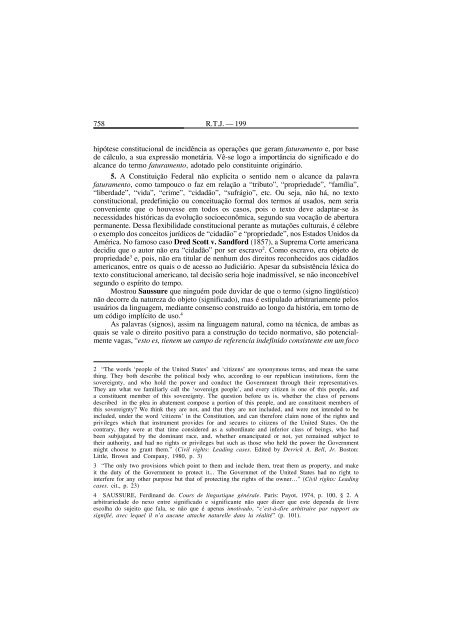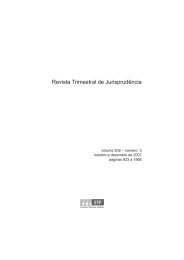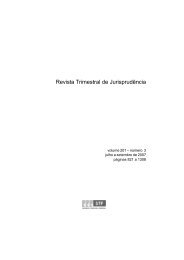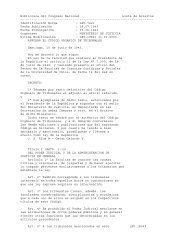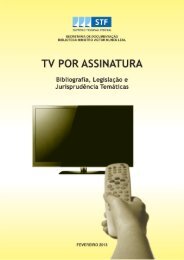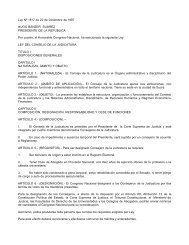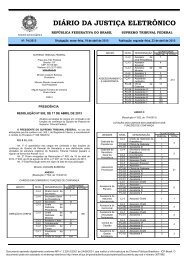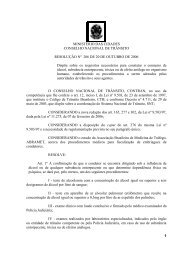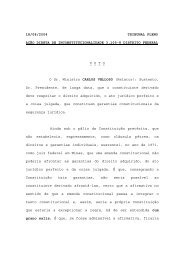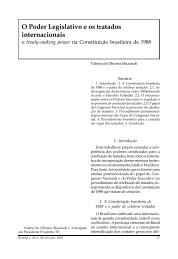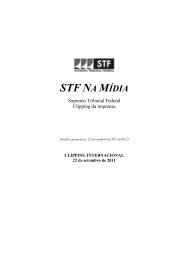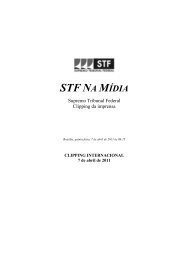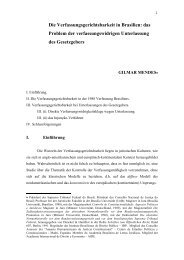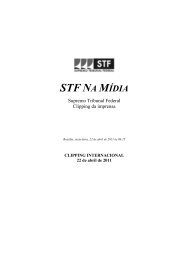- Page 1 and 2:
Supremo Tribunal Federal Revista Tr
- Page 3:
SUPREMO TRIBUNAL FEDERAL Ministra E
- Page 7:
SUMÁRIO Pág. ACÓRDÃOS .........
- Page 11 and 12:
MEDIDA CAUTELAR NA AÇÃO DECLARAT
- Page 13 and 14:
R.T.J. — 199 429 Medida liminar d
- Page 15 and 16:
R.T.J. — 199 431 constitucionalid
- Page 17 and 18:
R.T.J. — 199 433 17. Com efeito,
- Page 19 and 20:
R.T.J. — 199 435 VIII - dispor so
- Page 21 and 22:
R.T.J. — 199 437 V - rever, de of
- Page 23 and 24:
R.T.J. — 199 439 36. Em palavras
- Page 25 and 26:
R.T.J. — 199 441 (art. 44). Diga-
- Page 27 and 28:
R.T.J. — 199 443 “interpretaç
- Page 29 and 30:
R.T.J. — 199 445 5. De toda sorte
- Page 31 and 32:
R.T.J. — 199 447 O Direito não p
- Page 33 and 34:
R.T.J. — 199 449 A questão poder
- Page 35 and 36:
R.T.J. — 199 451 Quando instituí
- Page 37 and 38:
R.T.J. — 199 453 III - receber e
- Page 39 and 40:
R.T.J. — 199 455 implicitamente c
- Page 41 and 42:
R.T.J. — 199 457 b) adota conceit
- Page 43 and 44:
R.T.J. — 199 459 b) o “nepotism
- Page 45 and 46:
R.T.J. — 199 461 2. Nesta extensa
- Page 47 and 48:
R.T.J. — 199 463 O Sr. Ministro C
- Page 49 and 50:
R.T.J. — 199 465 extensa, alcanç
- Page 51 and 52:
R.T.J. — 199 467 ditos essenciais
- Page 53 and 54:
R.T.J. — 199 469 VOTO O Sr. Minis
- Page 55 and 56:
R.T.J. — 199 471 relevantes, em f
- Page 57 and 58:
R.T.J. — 199 473 José Alfredo de
- Page 59 and 60:
R.T.J. — 199 475 e fundado em bas
- Page 61 and 62:
R.T.J. — 199 477 O Sr. Ministro S
- Page 63 and 64:
R.T.J. — 199 479 Aqui, temos um e
- Page 65 and 66:
R.T.J. — 199 481 AÇÃO DIRETA DE
- Page 67 and 68:
R.T.J. — 199 483 § 2º Serviço
- Page 69 and 70:
R.T.J. — 199 485 Admiti, nos term
- Page 71 and 72:
R.T.J. — 199 487 Nacional — CF,
- Page 73 and 74:
R.T.J. — 199 489 III Começa o C
- Page 75 and 76:
R.T.J. — 199 491 192 — que disp
- Page 77 and 78:
R.T.J. — 199 493 tratando-se de t
- Page 79 and 80:
R.T.J. — 199 495 Constituição o
- Page 81 and 82:
R.T.J. — 199 497 25. Flávia Ross
- Page 83 and 84:
R.T.J. — 199 499 27. Conceito sim
- Page 85 and 86:
R.T.J. — 199 501 entidades bancá
- Page 87 and 88:
R.T.J. — 199 503 Quando do julgam
- Page 89 and 90:
R.T.J. — 199 505 daquele. Então,
- Page 91 and 92:
R.T.J. — 199 507 Manoel Gonçalve
- Page 93 and 94:
R.T.J. — 199 509 31. Isso ocorre
- Page 95 and 96:
R.T.J. — 199 511 O Sr. Ministro M
- Page 97 and 98:
R.T.J. — 199 513 “(...) Conside
- Page 99 and 100:
R.T.J. — 199 515 Constituição F
- Page 101 and 102:
R.T.J. — 199 517 4. A posição d
- Page 103 and 104:
R.T.J. — 199 519 Do outro, o SFN
- Page 105 and 106:
R.T.J. — 199 521 Trata-se daquela
- Page 107 and 108:
R.T.J. — 199 523 Leio Galeno Lace
- Page 109 and 110:
R.T.J. — 199 525 Não é difícil
- Page 111 and 112:
R.T.J. — 199 527 As figuras do po
- Page 113 and 114:
R.T.J. — 199 529 2. a proteção
- Page 115 and 116:
R.T.J. — 199 531 8. vedação de
- Page 117 and 118:
R.T.J. — 199 533 mente às suas i
- Page 119 and 120:
R.T.J. — 199 535 A elevação tax
- Page 121 and 122:
R.T.J. — 199 537 Pergunta-se: Qua
- Page 123 and 124:
R.T.J. — 199 539 trimestre de 200
- Page 125 and 126:
R.T.J. — 199 541 No caso das taxa
- Page 127 and 128:
R.T.J. — 199 543 Mesmo que haja,
- Page 129 and 130:
R.T.J. — 199 545 Está em Sergio
- Page 131 and 132:
R.T.J. — 199 547 Entre tais servi
- Page 133 and 134:
R.T.J. — 199 549 É um erro o ent
- Page 135 and 136:
R.T.J. — 199 551 VOTO (Vista) Inc
- Page 137 and 138:
R.T.J. — 199 553 2. O parecer da
- Page 139 and 140:
R.T.J. — 199 555 O caso mais abra
- Page 141 and 142:
R.T.J. — 199 557 Está a tratar d
- Page 143 and 144:
R.T.J. — 199 559 Por ser elemento
- Page 145 and 146:
R.T.J. — 199 561 Não há que se
- Page 147 and 148:
R.T.J. — 199 563 (a) alteração
- Page 149 and 150:
R.T.J. — 199 565 Já a proteção
- Page 151 and 152:
R.T.J. — 199 567 Onde o Conselho
- Page 153 and 154:
R.T.J. — 199 569 boletos, fichas
- Page 155 and 156:
R.T.J. — 199 571 Facilita a produ
- Page 157 and 158:
R.T.J. — 199 573 Para a consecuç
- Page 159 and 160:
R.T.J. — 199 575 Por outro lado,
- Page 161 and 162:
R.T.J. — 199 577 Em estudo de dez
- Page 163 and 164:
R.T.J. — 199 579 O que deixa clar
- Page 165 and 166:
R.T.J. — 199 581 Esse tema fica s
- Page 167 and 168:
R.T.J. — 199 583 Eu tive uma vant
- Page 169 and 170:
R.T.J. — 199 585 4.7. Conclusão
- Page 171 and 172:
R.T.J. — 199 587 “Definem-se co
- Page 173 and 174:
R.T.J. — 199 589 Assim, verifica-
- Page 175 and 176:
R.T.J. — 199 591 6. Conclusão Ca
- Page 177 and 178:
R.T.J. — 199 593 série de inciso
- Page 179 and 180:
R.T.J. — 199 595 Basta considerar
- Page 181 and 182:
R.T.J. — 199 597 VOTO (Vista) O S
- Page 183 and 184:
R.T.J. — 199 599 Vê-se bem, dest
- Page 185 and 186:
R.T.J. — 199 601 Evidente que, se
- Page 187 and 188:
R.T.J. — 199 603 Especial de Liqu
- Page 189 and 190:
R.T.J. — 199 605 O Sr. Ministro E
- Page 191 and 192:
R.T.J. — 199 607 VOTO O Sr. Minis
- Page 193 and 194:
R.T.J. — 199 609 VOTO (Antecipaç
- Page 195 and 196:
R.T.J. — 199 611 disciplinar as r
- Page 197 and 198:
R.T.J. — 199 613 sobre juros devi
- Page 199 and 200:
R.T.J. — 199 615 saúde e da segu
- Page 201 and 202:
R.T.J. — 199 617 O Código do Con
- Page 203 and 204:
R.T.J. — 199 619 recolhimentos co
- Page 205 and 206:
R.T.J. — 199 621 VOTO (Confirmaç
- Page 207 and 208:
R.T.J. — 199 623 para cada qual d
- Page 209 and 210:
R.T.J. — 199 625 11. Não é tudo
- Page 211 and 212:
R.T.J. — 199 627 no Distrito Fede
- Page 213 and 214:
R.T.J. — 199 629 sofreram reclass
- Page 215 and 216:
R.T.J. — 199 631 Federal de mudar
- Page 217 and 218:
R.T.J. — 199 633 Presidência do
- Page 219 and 220:
R.T.J. — 199 635 Art. 3º Os alim
- Page 221 and 222:
R.T.J. — 199 637 Após apontar pr
- Page 223 and 224:
R.T.J. — 199 639 VOTO A Sra. Mini
- Page 225 and 226:
R.T.J. — 199 641 produção, cons
- Page 227 and 228:
R.T.J. — 199 643 de fixar o perce
- Page 229 and 230:
R.T.J. — 199 645 5. Inviabilidade
- Page 231 and 232:
R.T.J. — 199 647 VOTO A Sra. Mini
- Page 233 and 234:
R.T.J. — 199 649 VOTO (Vista) O S
- Page 235 and 236:
R.T.J. — 199 651 Segue que há um
- Page 237 and 238:
R.T.J. — 199 653 conceder a segur
- Page 239 and 240:
R.T.J. — 199 655 dades, indeniza
- Page 241 and 242:
R.T.J. — 199 657 Mérito Nota-se,
- Page 243 and 244:
R.T.J. — 199 659 O Sr. Ministro N
- Page 245 and 246:
R.T.J. — 199 661 VOTO O Sr. Minis
- Page 247 and 248:
R.T.J. — 199 663 A Sra. Ministra
- Page 249 and 250:
R.T.J. — 199 665 O Sr. Ministro C
- Page 251 and 252:
R.T.J. — 199 667 ampliou os limit
- Page 253 and 254:
R.T.J. — 199 669 A Estação Ecol
- Page 255 and 256:
R.T.J. — 199 671 O Sr. Ministro C
- Page 257 and 258:
R.T.J. — 199 673 serviço prestad
- Page 259 and 260:
R.T.J. — 199 675 dos tribunais, c
- Page 261 and 262:
R.T.J. — 199 677 II - Inaplicabil
- Page 263 and 264:
R.T.J. — 199 679 VOTO O Sr. Minis
- Page 265 and 266:
R.T.J. — 199 681 ‘(...) 16. Ace
- Page 267 and 268:
R.T.J. — 199 683 21. Prova mais e
- Page 269 and 270:
R.T.J. — 199 685 “(...) 28. Nou
- Page 271 and 272:
R.T.J. — 199 687 O Sr. Ministro C
- Page 273 and 274:
R.T.J. — 199 689 . Requer, então
- Page 275 and 276:
R.T.J. — 199 691 Houve, é certo,
- Page 277 and 278:
R.T.J. — 199 693 propor uma açã
- Page 279 and 280:
R.T.J. — 199 695 . ‘Ora, confor
- Page 281 and 282:
R.T.J. — 199 697 7. Ora, com isso
- Page 283 and 284:
R.T.J. — 199 699 inadmitiu o REsp
- Page 285 and 286:
R.T.J. — 199 701 VOTO (Vista) O S
- Page 287 and 288:
R.T.J. — 199 703 Sua Excelência
- Page 289 and 290:
R.T.J. — 199 705 Então, até aqu
- Page 291 and 292: R.T.J. — 199 707 “Processual Pe
- Page 293 and 294: R.T.J. — 199 709 5. De lembrar-se
- Page 295 and 296: R.T.J. — 199 711 Mendes de Almeid
- Page 297 and 298: R.T.J. — 199 713 testemunhas arro
- Page 299 and 300: R.T.J. — 199 715 O Sr. Ministro M
- Page 301 and 302: R.T.J. — 199 717 RECURSO EM HABEA
- Page 303 and 304: R.T.J. — 199 719 Pleiteia seja o
- Page 305 and 306: R.T.J. — 199 721 Concluo, Sr. Pre
- Page 307 and 308: R.T.J. — 199 723 É importante as
- Page 309 and 310: R.T.J. — 199 725 Devo aduzir, ain
- Page 311 and 312: R.T.J. — 199 727 HABEAS CORPUS 87
- Page 313 and 314: R.T.J. — 199 729 representações
- Page 315 and 316: R.T.J. — 199 731 A eminente Relat
- Page 317 and 318: R.T.J. — 199 733 Nesses casos, é
- Page 319 and 320: R.T.J. — 199 735 EXTRATO DA ATA H
- Page 321 and 322: R.T.J. — 199 737 No extraordinár
- Page 323 and 324: R.T.J. — 199 739 partes — enten
- Page 325 and 326: R.T.J. — 199 741 VOTO (Vista) O S
- Page 327 and 328: R.T.J. — 199 743 Alegou a superve
- Page 329 and 330: R.T.J. — 199 745 Naquele julgamen
- Page 331 and 332: R.T.J. — 199 747 decisórios —
- Page 333 and 334: R.T.J. — 199 749 utilizados expre
- Page 335 and 336: R.T.J. — 199 751 Ao recurso espec
- Page 337 and 338: R.T.J. — 199 753 tem a confusão
- Page 339 and 340: R.T.J. — 199 755 constitucional d
- Page 341: R.T.J. — 199 757 referência cons
- Page 345 and 346: R.T.J. — 199 761 Essa interpreta
- Page 347 and 348: R.T.J. — 199 763 i - receita brut
- Page 349 and 350: R.T.J. — 199 765 Prevaleceu a int
- Page 351 and 352: R.T.J. — 199 767 Em relação a e
- Page 353 and 354: R.T.J. — 199 769 11. A questão p
- Page 355 and 356: R.T.J. — 199 771 “Interpretaç
- Page 357 and 358: R.T.J. — 199 773 . “De outro la
- Page 359 and 360: R.T.J. — 199 775 Tal competência
- Page 361 and 362: R.T.J. — 199 777 receitas por exe
- Page 363 and 364: R.T.J. — 199 779 Desde Kelsen 21
- Page 365 and 366: R.T.J. — 199 781 Corte, enunciand
- Page 367 and 368: R.T.J. — 199 783 E, de qualquer f
- Page 369 and 370: R.T.J. — 199 785 entender que o c
- Page 371 and 372: R.T.J. — 199 787 “Art. 17. Esta
- Page 373 and 374: R.T.J. — 199 789 atividades legí
- Page 375 and 376: R.T.J. — 199 791 A interpretaçã
- Page 377 and 378: R.T.J. — 199 793 Cumpre advertir,
- Page 379 and 380: R.T.J. — 199 795 3.6. Resta, por
- Page 381 and 382: R.T.J. — 199 797 Constituição F
- Page 383 and 384: R.T.J. — 199 799 O argumento é i
- Page 385 and 386: R.T.J. — 199 801 tentei mostrar n
- Page 387 and 388: R.T.J. — 199 803 placitando, sob
- Page 389 and 390: R.T.J. — 199 805 Os conceitos mer
- Page 391 and 392: R.T.J. — 199 807 ambígua e impre
- Page 393 and 394:
R.T.J. — 199 809 Insisto em que o
- Page 395 and 396:
R.T.J. — 199 811 “Torna-se nece
- Page 397 and 398:
R.T.J. — 199 813 mesmo plano, com
- Page 399 and 400:
R.T.J. — 199 815 O Sr. Ministro M
- Page 401 and 402:
R.T.J. — 199 817 O Sr. Ministro S
- Page 403 and 404:
R.T.J. — 199 819 O Sr. Ministro C
- Page 405 and 406:
R.T.J. — 199 821 Menos de um mês
- Page 407 and 408:
R.T.J. — 199 823 “Art. 22. (...
- Page 409 and 410:
R.T.J. — 199 825 O Sr. Ministro C
- Page 411 and 412:
R.T.J. — 199 827 Retorno ao voto
- Page 413 and 414:
R.T.J. — 199 829 O Sr. Ministro C
- Page 415 and 416:
R.T.J. — 199 831 O Sr. Ministro S
- Page 417 and 418:
R.T.J. — 199 833 Observo, ainda,
- Page 419 and 420:
R.T.J. — 199 835 poder legislativ
- Page 421 and 422:
R.T.J. — 199 837 EXTRATO DA ATA R
- Page 423 and 424:
R.T.J. — 199 839 redação do dip
- Page 425 and 426:
R.T.J. — 199 841 pelo desprovimen
- Page 427 and 428:
R.T.J. — 199 843 O Sr. Ministro G
- Page 429 and 430:
R.T.J. — 199 845 O Sr. Ministro G
- Page 431 and 432:
R.T.J. — 199 847 O Sr. Ministro C
- Page 433 and 434:
R.T.J. — 199 849 PROPOSTA O Sr. M
- Page 435 and 436:
R.T.J. — 199 851 Prossigo, Sr. Pr
- Page 437 and 438:
R.T.J. — 199 853 O Sr. Ministro S
- Page 439 and 440:
R.T.J. — 199 855 O Sr. Ministro C
- Page 441 and 442:
R.T.J. — 199 857 O Sr. Ministro S
- Page 443 and 444:
R.T.J. — 199 859 VOTO (Retificaç
- Page 445 and 446:
R.T.J. — 199 861 Presidência do
- Page 447 and 448:
R.T.J. — 199 863 Em qualquer das
- Page 449 and 450:
R.T.J. — 199 865 AGRAVO REGIMENTA
- Page 451 and 452:
R.T.J. — 199 867 O Sr. Ministro C
- Page 453 and 454:
R.T.J. — 199 869 EXTRATO DA ATA A
- Page 455:
ÍNDICE ALFABÉTICO
- Page 458 and 459:
IV Ali-Cab — ÍNDICE ALFABÉTICO
- Page 460 and 461:
VI Com-Con — ÍNDICE ALFABÉTICO
- Page 462 and 463:
VIII Dec-Ext — ÍNDICE ALFABÉTIC
- Page 464 and 465:
X Jui-Lib — ÍNDICE ALFABÉTICO A
- Page 466 and 467:
XII PrSTF Ct Ofe-Pro — ÍNDICE AL
- Page 468 and 469:
XIV Res-Trâ — ÍNDICE ALFABÉTIC
- Page 471:
ÍNDICE NUMÉRICO


